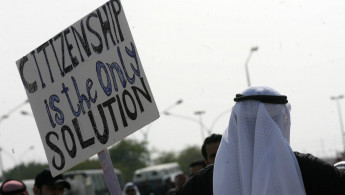Amnesty slams 'heavy prison sentences' for Kuwait's stateless Bidoon activists
The rights group said 15 men, including a leading rights activist, were arrested in a crackdown in July last year following peaceful demonstrations by members of the stateless Bidoon group.
They faced a number of charges including participation in unauthorised demonstrations, spreading false news and state security offences, it added.
"A Kuwaiti criminal court today handed prison sentences of between life and 10 years in prison to three men from the stateless bidoon community, including one in his absence, for their peaceful activism," the London-based group said.
"The court acquitted one man, released the 12 remaining men on a pledge of good conduct for two years, and the additional condition of bail payment of 1,000 Kuwaiti dinars ($3,300) each for five of them," including rights activist Abdulhakim al-Fadhli.
Twitter Post
|
Read more: Watch: Kuwaiti married couple arrested for posting this 'immoral' video
The sentences were "yet another illustration of the Kuwaiti authorities' refusal to recognise the rights of the Bidoon," Heba Morayef, Amnesty's director for the Middle East and North Africa, said in a statement.
"These men should be commended for peacefully rallying and speaking out for their rights against Kuwait's discrimination of the Bidoon," she said.
The arrests took place between 11 and 14 July following protests by members of the Bidoon group in Kuwait after a fellow stateless person, 20-year-old Ayed Hamad Moudath, committed suicide for reportedly being unable to obtain official documents and ultimately losing his job.
Rights groups have repeatedly accused Kuwait of mistreating about 100,000 stateless Arabs, saying the Gulf country has failed to recognise the right of these long-term residents to citizenship.
Kuwait has insisted that most Bidoon or their ancestors came from neighbouring countries and do not qualify for citizenship.
According to Amnesty, the Bidoon face restrictions on employment, health care and state support provided to Kuwaiti citizens despite reforms announced in 2015.
Last year, Kuwait said it would soon implement a "fair solution" to the decades-long marginalisation of the country's stateless Bidoon population.
"There will finally be a drastic and fair solution to this issue during summer," parliamentary Speaker Marzouq al-Ghanem said after the meeting, saying the plan has not yet been made public to increase the likelihood of it succeeding.
He added that the solution will not include giving the Bidoon population Kuwaiti citizenship, nor will it interfere with the "national identity" of the country – rhetoric that has for years been blasted as racist.
Follow us on Twitter and Instagram to stay connected





 Follow the Middle East's top stories in English at The New Arab on Google News
Follow the Middle East's top stories in English at The New Arab on Google News
![The UAE is widely suspected of arming the RSF militia [Getty]](/sites/default/files/styles/image_330x185/public/2024-11/GettyImages-472529908.jpg?h=69f2b9d0&itok=Yauw3YTG)
![Netanyahu furiously denounced the ICC [Getty]](/sites/default/files/styles/image_330x185/public/2024-11/GettyImages-2169352575.jpg?h=199d8c1f&itok=-vRiruf5)
![Both Hamas and the Palestinian Authority welcomed the ICC arrest warrants [Getty]](/sites/default/files/styles/image_330x185/public/2024-11/GettyImages-2178351173.jpg?h=199d8c1f&itok=TV858iVg)